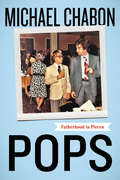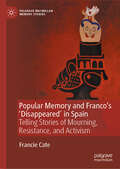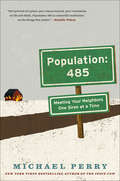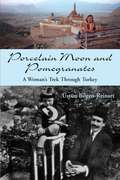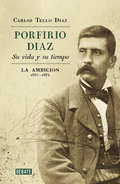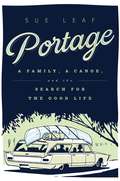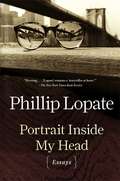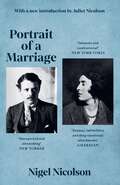- Table View
- List View
Poppy The Street Dog: How an extraordinary dog helped bring hope to the homeless
by Michelle ClarkA heartwarming true animal story, for fans of A Dog's Purpose, A Street Cat Named Bob and Marley & Me.Michelle Clark has loved animals all her life, filling her home with a menagerie of stray cats and abandoned dogs. But when her outreach work with London's homeless community leads to a chance meeting with a desperate man, and a quest to find a missing Staffie named Poppy, she has no idea that her life will be transformed forever.Poppy is unlike any other dog that Michelle has ever met, with her unwavering loyalty, gentle nature and wise, kind eyes. Soon, Poppy finds her way not just into Michelle's heart, but into her home too.Inspired Poppy's extraordinary love and devotion, Michelle finds herself at the start of a journey to bring hope and help to the hundreds of other precious dogs who call the city streets their home.An inspiring, heartwarming true story about the incredible bond that exists between humans and animals, and how, in rescuing them, we can also rescue ourselves.
Pops: Fatherhood in Pieces
by Michael Chabon“Magical prose stylist” Michael Chabon (Michiko Kakutani, New York Times) delivers a collection of essays—heartfelt, humorous, insightful, wise—on the meaning of fatherhood.For the September 2016 issue of GQ, Michael Chabon wrote a piece about accompanying his son Abraham Chabon, then thirteen, to Paris Men’s Fashion Week. Possessed with a precocious sense of style, Abe was in his element chatting with designers he idolized and turning a critical eye to the freshest runway looks of the season; Chabon Sr., whose interest in clothing stops at “thrift-shopping for vintage western shirts or Hermès neckties,” sat idly by, staving off yawns and fighting the impulse that the whole thing was a massive waste of time. Despite his own indifference, however, what gradually emerged as Chabon ferried his son to and from fashion shows was a deep respect for his son’s passion. The piece quickly became a viral sensation.With the GQ story as its centerpiece, and featuring six additional essays plus an introduction, Pops illuminates the meaning, magic, and mysteries of fatherhood as only Michael Chabon can.
Pops: Learning to Be a Son and a Father
by Craig MelvinA “deeply personal, heartwarming” exploration of fatherhood, addiction, and resiliency from the award–winning news anchor of NBC’s Today show (Shondaland).Growing up in Columbia, South Carolina, Craig Melvin had a fraught relationship with his father. A hard-drinking man who worked the graveyard shift at a postal facility, Lawrence Melvin was a distant parent. Craig found ways of connecting with his father through sports and tinkering with his beloved 1973 Pontiac LeMans. But as Lawrence’s drinking spiraled out of control, their bond was stretched to the breaking point. Fortunately, Craig had a loving, fiercely protective mother who held the family together. He also had a series of surrogate father figures in his life—uncles, teachers, workplace mentors—who by their examples helped him figure out the kind of person and father he wanted to be. Pops is the story of all these men, and of the inspiring fathers Craig has met reporting his “Dads Got This Series” on the Today show. For Craig, this book is an opportunity to better understand his father; to interrogate his family’s legacy of addiction and despair as well as transformation and redemption; and to explore the challenges facing all dads—including Craig himself, a father of two young children.
Poptastic!: My Life in Radio
by Tony BlackburnTony Blackburn is probably one of the most recognisable disc jockeys working in Britain today, and is always busy doing what he does best - playing music to listeners. With Radio One celebrating its 40th anniversary this year, Tony feels the time is right to commemorate his own anniversary, and look back on the time he has spent in radio and the media. The days spent as a radio pirate, to becoming the number one DJ in the UK for the best part of a decade. The stars he befriended, the rivalries in radio he endured, the friendships made, and broken, all will be told in his candid style. Much as John Peel's book was a reflection of one style of DJing, so will this book be for Tony's unique brand of playing and enjoying music. Much derided by some comedians, but very much still going strong, and ever popular.(p) 2007 Orion Publishing Group
Popular Images of American Presidents
by William C. SpragensHow our Presidents are rated by various groups.
Popular Memory and Franco's 'Disappeared' in Spain: Telling Stories of Mourning, Resistance, and Activism (Palgrave Macmillan Memory Studies)
by Francie Cate“Francie Cate’s Popular Memory and Franco’s ‘Disappeared’ is an obra magistral, an opus magnum, a masterwork. It is an in-depth and broad study in which further research on memory, imposed forgetting, counter-memory, and the dynamics of cultural memory will be rooted.” – Maureen Tobin Stanley, University of Minnesota Duluth, USA This book examines a "people's history" of the Spanish Civil War's anti-fascists who lost their 1936-1939 fight against far right military insurgents. The book argues that the regime’s “disappeared” have in fact since 1936 been the most visible protagonists safeguarded in the shared collective memory of the war’s losers. Narratives about Franco’s up to 150,000 civilian shooting victims—stories told in the form of memoirs, political speeches, visual art, film, novels, and oral testimonies—form the centerpiece of this study. How have these narratives told by the war’s losers--focused explicitly on the figure of the dead body—been mobilized in periods of political upheaval from 1936 to the present, including WWII; the 1950s and 60s of the Cold War; the 1970s and 80s Spanish Transition; ongoing mass media “culture wars” that have polarized the Right and the Left since public exhumations of unmarked graves began in the year 2000? Through fieldwork in the province of Cádiz, the authorhas also recorded interviews with family members of citizens who were murdered. Through oral narratives, an entire community—violently punished during the years of the dictatorship—succeeded in keeping alive an alternative history of the pre-war enterprise to establish the 1931 Spanish democratic Republic and to build a modern nation bound by constitutional law. The discursive commonalities identified in the wide-ranging testimonies—including pioneering researchers’ publications beginning in the 1970s—constitute a fascinating textual topography of popular cultural memory. This book argues that this treasure trove of storytelling preserved an initially clandestine counter narrative of anti-Francoist resistance, as well as dreams of justice for the dead.
Popular: Vintage Wisdom for a Modern Geek
by Maya Van WagenenA breakout teen author explores the true meaning of popularity in a hysterically funny, touchingly honest contemporary memoir. Can curlers, girdles, Vaseline, and a strand of pearls help a shy girl become popular? Maya Van Wagenen is about to find out. Stuck near the bottom of the social ladder at "pretty much the lowest level of people at school who aren't paid to be here," Maya has never been popular. But before starting eighth grade, she decides to begin a unique social experiment: spend the school year following a 1950s popularity guide, written by former teen model Betty Cornell. The real-life results are hilarious, painful, and filled with unexpected surprises. Told with humor and grace, Maya's journey offers readers of all ages a thoroughly contemporary example of kindness and self-confidence, along with a better understanding of what it means to be popular.
Population One: Autism, Adversity, and the Will to Succeed
by Tyler McNamerBeing different from the masses is one of the greatest gifts that you possess! Let s face it: Who wants to be just like everyone else? Talk about boring! People come in all shapes and sizes and are born with natural and unnatural gifts and talents like no other, and your greatest challenge is to discover your gifts and then apply them to the world to create a better place, a better planet, a better universe! That is my challenge to you so that all of us can get along peacefully and become truly a population of one. I would like to ask you some questions to help you discover what makes you unique, different, and awesome. Are you different? Are you unique? Do you look different than others? Talk differently than others? Do you walk differently than others? Have you been born with talents that very few others have? Have you been brainwashed to look at your talents as a disability? Do you stay up nights dwelling on all the things in life you don t have, rather than focus on all the blessings you do have? Have you ever been bullied at school, at home, and in many areas in your life? Have you ever been called a retard, dumb, disabled ? If you have answered yes to any of these questions, perhaps you have yet to understand, accept, and apply your unique gifts to make the world a better place. If you have answered Yes to any of these questions, I feel your pain, I have walked in your shoes, and I can empathize with your situation. I have been bullied, called a retard, told that I am disabled, put in special classes, advised that I should not expect to reach my goals. My name is Tyler McNamer and I have been called ALL of the above many, many times in my life.
Population: 485
by Michael PerryHere the local vigilante is a farmer's wife armed with a pistol and a Bible, the most senior member of the volunteer fire department is a cross-eyed butcher with one kidney and two ex-wives (both of whom work at the only gas station in town), and the back roads are haunted by the ghosts of children and farmers. Michael Perry loves this place. He grew up here, and now -- after a decade away -- he has returned. Unable to polka or repair his own pickup, his farm-boy hands gone soft after years of writing, Mike figures the best way to regain his credibility is to join the volunteer fire department. Against a backdrop of fires and tangled wrecks, bar fights and smelt feeds, he tells a frequently comic tale leavened with moments of heartbreaking delicacy and searing tragedy.
Por los caminos de cien años de soledad
by Satoko KawamuraPor los caminos de Cien años de soledad es un recorrido emocionante porlos sitios que sirvieron como base creativa para la novela más celebradade Gabriel García Márquez. Aderezado con anécdotas deliciosas de la vidadel nobel colombiano, con entrevistas a sus parientes y a sus amigoscercanos, con pasajes memorables de su infancia y de su adolescencia,este libro entreteje literatura y realidad para entregarnos un homenajea la vez ágil, sagaz y conmovedor.
Por los ojos de mi padre
by Franklin GrahamBilly Graham, el amado evangelista y respetado hombre de Dios, nunca dudó de su propósito en la vida: ayudar a las personas a tener una relación personal con Dios a través del conocimiento salvador de Jesucristo. Ese fue un llamado que creció cada vez más en intensidad y Billy lo aceptó por completo durante su ministerio activo y más allá de este. No obstante, al igual que muchos otros hombres, él se dedicó también al llamado igualmente valioso de ser un esposo y padre amoroso. Aunque la mayoría de la gente conocía a Billy Graham como una leyenda viviente, Frankin Graham lo conoció como su papá. Y aunque las generaciones actuales y futuras llegarán a sus propias conclusiones acerca de Billy Graham y el legado de su entrega a Cristo, nadie puede abordar el tema con más detalles y con toda la seriedad del caso que un hijo que se crio a la sombra de la vida de su padre y del ejemplo de su amor. «Mi padre dejó un testimonio de Dios», explica Franklin, «y una herencia que no quedará enterrada en una tumba, sino que seguirá guiando a la gente a su destino celestial. El Señor le dirá a él y a todos los que le sirven con obediencia: “Bien, buen siervo y fiel” (Mateo 25.21)». Este libro relata la notable vida de Billy no como la historia de un gigante espiritual, sino de la forma en que Franklin siempre lo ha visto: a través de los ojos de su padre. X
Por qué volvías cada verano
by Belén López PeiróEl libro que terminó con el secreto alrededor del abuso y se convirtió en clave de cientos de denuncias. «Hay libros que son hechos. Este es uno: se puede leer como una novela, como una denuncia, como la propia construcción. Porque es todo eso: una novela polifónica, el relato de un abuso padecido en la adolescencia en manos de un hombre armado, un tío poderoso, el macho de la familia y del pueblo. Y un hecho: acá está la mujer que fue la nena que ese tipo quiso romper para su uso personal. Y está toda entera, fuerte, hablando de lo que da tanta vergüenza hablar. Escribiendo contra todos los que intentaron callarla. Contra sí misma, incluso, a veces. Este libro es una batalla: la que ganó Belén López Peiró iniciando un juicio, buscando asesoramiento legal en un sistema que no les prodiga justicia a las víctimas, contándoles a todos sus parientes y vecinos, obligándolos a ver lo que no querían ver. Y escribiendo, haciendo de su propia experiencia una obra exquisita, una intervención política poderosa. Y muy necesaria».Gabriela Cabezón Cámara La crítica dijo: «El mapa de aquello que nos sucede, por fin al completo. Imprescindible».Brigitte Vasallo «Para mí un libro definitivo sobre el abuso sexual, además del descubrimiento de una voz de la que quiero leer mucho más».Nuria Labari «No, no es un libro para disfrutar. Es un libro para entender, para empatizar, para hacer real lo que no muchas se atreven a decir en alto».Andra.eus «Por eso la forma de este libro es tan perfecta o precisa para abordar la violencia machista, porque consigue hacer emocionalmente muy palpable la complejidad del entramado que sostiene la impunidad, el ruido de los juicios de los otros en la cabeza de una víctima, cuando no hay jerarquías, ni valoraciones, ni justicia. Solo la nítida ajenidad de todos ante la experiencia propia de la vulnerabilidad».Gabriela Wiener, elDiario.es «Belén López Peiró relata el abuso sexual sin ambigüedades, pero con mucha literatura». Mauro Libertella
Porcelain Moon and Pomegranates: A Woman's Trek Through Turkey
by Üstün Bilgen-ReinartFor millennia, the land now called Turkey has been at the crossroads of history. A bridge between Europe and Asia, between West and East, between Christianity and Islam, the peninsula also known as Anatolia, the place where the sun rises, is one of the oldest continually inhabited regions on the planet. In this unique blend of memoir and travel literature, Üstün Bilgen-Reinart explores the people, politics, and passions of her native country, whisking the reader on a journey through time, memory, and space. She searches deep into the roots of her own ancestry and uncovers a family secret, breaks taboos in a nation that still takes tradition very seriously, and navigates through dangerous territory that sees her investigating brothels in Ankara, probing honour murders in Sanliurfa, encountering Kurds in the remote southeast, and witnessing the rape of the earth by a gold mining company in Bergama.
Porcelain: A Memoir
by MobyFrom one of the most interesting and iconic musicians of our time, a piercingly tender, funny, and harrowing account of the path from suburban poverty and alienation to a life of beauty, squalor, and unlikely success out of the NYC club scene of the late '80s and '90s.There were many reasons Moby was never going to make it as a DJ and musician in the New York club scene. This was the New York of Palladium; of Mars, Limelight, and Twilo; of unchecked, drug-fueled hedonism in pumping clubs where dance music was still largely underground, popular chiefly among working-class African Americans and Latinos. And then there was Moby--not just a poor, skinny white kid from Connecticut, but a devout Christian, a vegan, and a teetotaler. He would learn what it was to be spat on, to live on almost nothing. But it was perhaps the last good time for an artist to live on nothing in New York City: the age of AIDS and crack but also of a defiantly festive cultural underworld. Not without drama, he found his way. But success was not uncomplicated; it led to wretched, if in hindsight sometimes hilarious, excess and proved all too fleeting. And so by the end of the decade, Moby contemplated an end in his career and elsewhere in his life, and put that emotion into what he assumed would be his swan song, his good-bye to all that, the album that would in fact be the beginning of an astonishing new phase: the multimillion-selling Play. At once bighearted and remorseless in its excavation of a lost world, Porcelain is both a chronicle of a city and a time and a deeply intimate exploration of finding one's place during the most gloriously anxious period in life, when you're on your own, betting on yourself, but have no idea how the story ends, and so you live with the honest dread that you're one false step from being thrown out on your face. Moby's voice resonates with honesty, wit, and, above all, an unshakable passion for his music that steered him through some very rough seas. Porcelain is about making it, losing it, loving it, and hating it. It's about finding your people, your place, thinking you've lost them both, and then, somehow, when you think it's over, from a place of well-earned despair, creating a masterpiece. As a portrait of the young artist, Porcelain is a masterpiece in its own right, fit for the short shelf of musicians' memoirs that capture not just a scene but an age, and something timeless about the human condition. Push play.
Porcelain: A Memoir
by MobyFrom one of the most interesting and iconic musicians of our time, a piercingly tender, funny, and harrowing account of the path from suburban poverty and alienation to a life of beauty, squalor, and unlikely success out of the NYC club scene of the late '80s and '90s.There were many reasons Moby was never going to make it as a DJ and musician in the New York club scene. This was the New York of Palladium; of Mars, Limelight, and Twilo; of unchecked, drug-fueled hedonism in pumping clubs where dance music was still largely underground, popular chiefly among working-class African Americans and Latinos. And then there was Moby--not just a poor, skinny white kid from Connecticut, but a devout Christian, a vegan, and a teetotaler. He would learn what it was to be spat on, to live on almost nothing. But it was perhaps the last good time for an artist to live on nothing in New York City: the age of AIDS and crack but also of a defiantly festive cultural underworld. Not without drama, he found his way. But success was not uncomplicated; it led to wretched, if in hindsight sometimes hilarious, excess and proved all too fleeting. And so by the end of the decade, Moby contemplated an end in his career and elsewhere in his life, and put that emotion into what he assumed would be his swan song, his good-bye to all that, the album that would in fact be the beginning of an astonishing new phase: the multimillion-selling Play. At once bighearted and remorseless in its excavation of a lost world, Porcelain is both a chronicle of a city and a time and a deeply intimate exploration of finding one's place during the most gloriously anxious period in life, when you're on your own, betting on yourself, but have no idea how the story ends, and so you live with the honest dread that you're one false step from being thrown out on your face. Moby's voice resonates with honesty, wit, and, above all, an unshakable passion for his music that steered him through some very rough seas. Porcelain is about making it, losing it, loving it, and hating it. It's about finding your people, your place, thinking you've lost them both, and then, somehow, when you think it's over, from a place of well-earned despair, creating a masterpiece. As a portrait of the young artist, Porcelain is a masterpiece in its own right, fit for the short shelf of musicians' memoirs that capture not just a scene but an age, and something timeless about the human condition. Push play.
Porch Stories: A Grandmother's Guide to Happiness
by Jewell Parker RhodesAward-winning author Jewell Parker Rhodes offers a loving tribute to her beloved grandmother, the love she received, and the lessons she learned.
Porfirio Díaz. Su vida y su tiempo II: La ambición: 1867-1884
by Carlos Tello DíazUno de los personajes más fascinantes en la historia de México. Porfirio Díaz. Su vida y su tiempo es la biografía definitiva sobre esta figura indiscutible de nuestra historia. Sin redimir ni satanizar, este libro es el mayor esfuerzo por contar las cosas como en realidad sucedieron. Al triunfar la República contra la Intervención y el Imperio, los liberales conquistaron el poder en México, pero fueron consumidos por la discordia, divididos con respecto de la reelección del presidente Juárez. Unos estaban a favor; otros estaban en contra. Los que estaban en contra postularon la candidatura de Porfirio Díaz, el general más popular del Ejército de la República, hasta entonces amigo y aliado de don Benito. Así comienza la historia que cuenta La ambición (1867-1884), continuación de La guerra (1830-1867), obra galardonada con el Premio Mazatlán de Literatura. El libro relata los años trágicos de Porfirio en la finca de La Noria; el fracaso de su rebelión contra Juárez; su paso por La Habana, Nueva York y San Francisco; las vicisitudes que vivió hasta triunfar en la revolución que lo llevó a la Presidencia. Narra con detalle la defensa que hizo de la patria frente a la amenaza de guerra con los Estados Unidos y rescata, también, el telegrama en clave donde ordenó reprimir la rebelión de Veracruz, que pasó a la historia con la frase Mátalos en caliente. Esta biografía retrata al rebelde y al estadista, pero también al hombre. Privilegia la voz de los protagonistas de los hechos, que escuchamos a través de sus cartas, sus diarios y sus testimonios, rescatados de los archivos por el historiador Carlos Tello Díaz.
Porque Andamos Tão Exaustos?
by Vânia CastanheiraQuantas vezes, depois de um dia de trabalho, foi para casa trabalhar? Quantas vezes acordou cansado? Este livro vai ajudá-lo a viver melhor e a evitar o Burnout,síndrome resultante de stress crónico no trabalho, numa linguagem acessível, com casos reais e exercícios práticos. O burnout foi finalmente reconhecido pela Organização Mundial de Saúde como uma síndrome resultante de stress crónico no trabalho, que não foi bem gerido. Fadiga, tristeza acentuada, irritabilidade, aborrecimento, perda de motivação, sobrecarga de trabalho, rigidez e inflexibilidade. Todos são comportamentos que podem significar um esgotamento profissional. Neste livro da Medical Coach Vânia Castanheira, vai encontrar uma explicação detalhada do que é o Burnout, vai aprender a identificar os sintomas e de como evitá-lo. E como sair dele, caso já lá esteja, com muitas dicas práticas e fáceis de seguir.
Porquinho da Índia para o Brunch A minha vida enquanto médica missionária no Equador
by Fabiana Rodrigues Castelo Branco Andrea Gardiner“Porquinho da Índia para o Brunch oferece excelente perspectiva sobre a rotina diária do Equador, com as privações da pobreza os perigos junto à fé simples e a hospitalidade das pessoas que são cuidadas pela Dra.Andrea Gardiner. No desenrolar da história, Andrea honestamente compartilha suas próprias dúvidas e esforços enquanto cria as suas filhas em uma cultura muito diferente da do seu nascimento. Mais do que uma história de uma médica missionária,esta é bem mais um desdobramento da jornada de confiança e obediência a Deus de uma mulher, chamada por Ele para servir aos que sofrem..Eu sinceramente recomendo Porquinho da Índia para o Brunch, mas tenha cuidado – você será desafiado!” Catherine Campbell, autora de ‘Under the Rainbow’ e ‘God Knows Your Name’
Portable Prairie: Confessions of an Unsettled Midwesterner
by M. J. AndersonIN A MOVING AND BITTERSWEET STORY, M. J. Andersen chronicles her childhood and adolescence in South Dakota, her departure to forge her own life, and her persistent longing for the landscape she left behind. Her hometown, given the fictional name of Plainville, is so quiet that one local family regularly parks by the tracks to watch the train pass through. Yet small-town life and, especially, the prairie prove to be fertile ground for Andersen's imagination. Exploring subjects as seemingly unrelated as Roy Rogers and Tolstoy's beloved Anna Karenina, she repeatedly locates a transcendent connection with South Dakota's broad horizon. Andersen introduces us to her hardworking newspaper family, who produce one of Plainville's two competing weeklies; to Job's Daughters, a Christian association intended to prepare young women for adversity (Plainville's chapter assumes the added responsibility of throwing the town's best teen dances); and even to a local variety of hardy alfalfa, to which her best friend has a surprising kinship.
Portage Lake: Memories of an Ojibwe Childhood
by Maude KeggMaude Kegg's memories build a bridge to a time when building birch-bark wigwams and harvesting turtles were still part of the everyday life of a native girl in the mid-west. In this bilingual book, this elder of the Minnesota Anishinaabe reminisces about her childhood. An English translation of each story appears on pages facing the original Ojibwe text, and the editor John Nicholds has included a full Ojibwe-English glossary with study aids.
Portage: A Family, a Canoe, and the Search for the Good Life
by Sue LeafWhen as a child she first saw a canoe gliding on Lake Alexander in central Minnesota, Sue Leaf was mesmerized. The enchantment stayed with her and shimmers throughout this book as we join Leaf and her family in canoeing the waterways of North America, always on the lookout for the good life amid the splendors and surprises of the natural world.The journey begins with a trip to the border lakes of the Boundary Waters Canoe Area Wilderness, then wanders into the many beautiful little rivers of Minnesota and Wisconsin, the provincial parks of Canada, the Louisiana bayou, and the arid West. A biologist and birder, Leaf considers natural history and geology, noticing which plants are growing along the water and which birds are flitting among the branches. Traveling the routes of the Ojibwe, voyageurs, and map-making explorers, she reflects on the region&’s history, peopling her pages with Lewis and Clark, Jean Lafitte, Henry Schoolcraft, and Canada&’s Group of Seven artists. Part travelogue, part natural and cultural history, Portage is the memoir of one family&’s thirty-five-year venture into the watery expanse of the world. Through sunny days and stormy hours and a few hair-raising moments, Sue and her husband, Tom, celebrate anniversaries on the water; haul their four kids along on family adventures; and occasionally make the paddle a social outing with friends. Along the way they contend with their own human nature: they run rapids when it would have been wiser to portage, take portages and learn truths about aging, avoid portages and ponder risk-taking. Through it all, out in the open, in the wild, in the blue, exploring the river means encountering life—good decisions and missed chances, risks and surprises, and the inevitable changes that occur as a family canoes through time and learns what it means to be human in this natural world.
Portia: The World Of Abigail Adams
by Edith B. GellesPortia, the first woman-centered biography of Abigail Adams, details the issues, events, and relationships of Adams's life. It is as much a social and cultural history of Adams's time as it is her life story.
Portrait Inside My Head
by Phillip LopateIn this stunning new collection of personal essays, distinguished author Phillip Lopate weaves together the colorful threads of a life well lived and brings us on an invigorating and thoughtful journey through memory, culture, parenthood, the trials of marriage both young and old, and an extraordinary look at New York's storied past and present. Opening with his family life, Lopate invites us first into his rough-and-tumble childhood on the streets of Brooklyn, learning the all-important art of cowardice. From there, he takes us to the ball game to discuss the trouble with ex-baseball fans; to high tea at the Plaza; to the theater to dissect Virginia Woolf 's opinion that film should keep its hands off literature; and to visit his brother, radio personality Leonard Lopate, offering a rare glimpse into the unique sibling rivalry between two men at the top of their fields. Throughout this rich, ambitious, deliciously readable collection, Lopate's easy, conversational style pushes his piercing insights to new depths, celebrating the life of the mind--its triumphs and limitations--and illuminating memories and feelings both distant and immediate. The result is a charming and spirited new book from the undisputed master of the form.
Portrait Of A Marriage: Vita Sackville-West and Harold Nicolson
by Vita Sackville-West Nigel NicolsonThe classic story of the relationship between Vita Sackville-West and Harold Nicolson, and a unique portrait of the Bloomsbury Group.'A brilliantly structured account of the dramas, infidelities and deep emotional attachments' GUARDIAN'An intimate and controversial account of his bisexual parents' open relationship' NEW YORK TIMES'One of the most absorbing stories, built around two very remarkable people, ever to stray from Gothic fiction into real life' TLSThe marriage was that between the two writers, Vita Sackville-West and Harold Nicolson and the portrait is drawn partly by Vita herself in an autobiography which she left behind at her death in 1962 and partly by her son, Nigel. It was one of the happiest and strangest marriages there has ever been. Both Vita and Harold were always in love with other people and each gave the other full liberty 'without enquiry or reproach', knowing that their love for each other would be unaffected and even strengthened by the crises which it survived. This account of their love story is now a modern classic.

